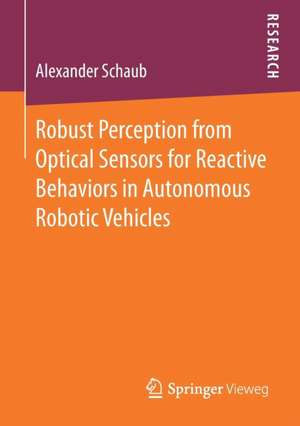Robust Perception from Optical Sensors for Reactive Behaviors in Autonomous Robotic Vehicles
Autor Alexander Schauben Limba Engleză Paperback – 27 iul 2017
Preț: 384.86 lei
Nou
Puncte Express: 577
Preț estimativ în valută:
73.65€ • 76.09$ • 61.30£
73.65€ • 76.09$ • 61.30£
Carte tipărită la comandă
Livrare economică 26 martie-09 aprilie
Preluare comenzi: 021 569.72.76
Specificații
ISBN-13: 9783658190866
ISBN-10: 3658190868
Pagini: 267
Ilustrații: XV, 267 p. 127 illus., 123 illus. in color.
Dimensiuni: 148 x 210 mm
Greutate: 0.34 kg
Ediția:1st ed. 2018
Editura: Springer Fachmedien Wiesbaden
Colecția Springer Vieweg
Locul publicării:Wiesbaden, Germany
ISBN-10: 3658190868
Pagini: 267
Ilustrații: XV, 267 p. 127 illus., 123 illus. in color.
Dimensiuni: 148 x 210 mm
Greutate: 0.34 kg
Ediția:1st ed. 2018
Editura: Springer Fachmedien Wiesbaden
Colecția Springer Vieweg
Locul publicării:Wiesbaden, Germany
Cuprins
Why Mobile Robots Should Have an Artificial Instinct.- Vision-Based Reactive Controllers.- Evaluation in Real World Tests and in Simulation.
Notă biografică
Alexander Schaub joined the Robotics and Mechatronics Center of the German Aerospace Center (DLR) in 2009 and worked in the development of a robotic electric vehicle and researched in the field of vision-based control and reactive instinctive behaviors for autonomous vehicle. In 2017, he started an MBA at HEC Paris and will continue working in the field of autonomous driving afterwards.
Textul de pe ultima copertă
Alexander Schaub examines how a reactive instinctive behavior, similar to instinctive reactions as incorporated by living beings, can be achieved for intelligent mobile robots to extend the classic reasoning approaches. He identifies possible applications for reactive approaches, as they enable a fast response time, increase robustness and have a high abstraction ability, even though reactive methods are not universally applicable. The chosen applications are obstacle avoidance and relative positioning – which can also be utilized for navigation – and a combination of both. The implementation of reactive instinctive behaviors for the identified tasks is then validated in simulation together with real world experiments.
Contents
- Why Mobile Robots Should Have an Artificial Instinct
- Vision-Based Reactive Controllers
- Evaluation in Real World Tests and in Simulation
Target Groups
- Lecturersand students in the field of Robotics, Control Engineering, Computer Vision
- Practitioners in the field of Intelligent Vehicles, Mobile Robots
About the Author
Alexander Schaub joined the Robotics and Mechatronics Center of the German Aerospace Center (DLR) in 2009 and worked in the development of a robotic electric vehicle and researched in the field of vision-based control and reactive instinctive behaviors for autonomous vehicle. In 2017, he started an MBA at HEC Paris and will continue working in the field of autonomous driving afterwards.
Caracteristici
Publication in the field of technical sciences Includes supplementary material: sn.pub/extras
